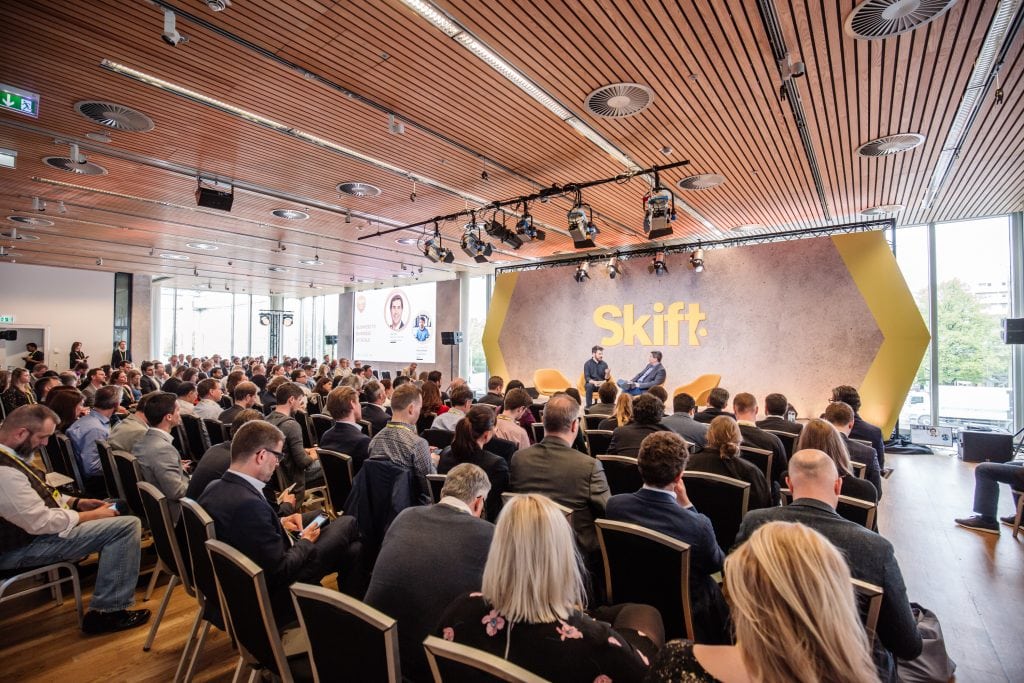The 5 Big Themes Driving Travel in 2018: Lessons From Skift Forum Europe

Skift Take
Travel executives descended on Berlin last week to participate in the second annual Skift Forum Europe. They came full of ideas about the future, observations and a readiness to defend their businesses. Their optimism was apparent, buoyed by an 8 percent uptick in tourism arrivals in Europe in 2017 versus a dire scenario a year earlier.
Because of its long, rich history in the tourism business, Europe is often a beacon for the entire industry. Its executives more often than not signal forthcoming trends that will eventually impact the top and bottom lines for companies across the globe. The Skift team in Berlin peppered those executives with questions about trends and the current competitive environment. Here are five ideas we culled from those conversations that serve as key takeaways for you.
The Reinvention Tour
The idea that travel brands, even long-established ones, need to consistently reinvent themselves was, perhaps, best expressed by AccorHotels CEO Sebastien Bazin.
Bazin characterized AccorHotels, which has been in business for 50 years, as “a very big sleeping giant” that had “great brands, great talent,” but was “too introverted and two shy and not showing muscles.” He added that Accor was “perceived as being a second-tier” hotel company.
Bazin said that when he became CEO in 2013, he made it his mission to transform and reinvent AccorHotels into a first-tier company with “first-mover advantage” that extends beyond simply travel and hospitality to be a brand that’s as vital to consumers’ lives as Google, Apple, Facebook, Tencent, and Baidu.
“We need to go beyond only being an accommodation and a hotel room … We want to enlarge and multiply the level of frequency I will have with you even when you don’t travel,” Bazin said. “That’s what I’m trying to build.”
Another hospitality company trying to reinvent itself is Marriott. Its homesharing pilot with Hostmaker in London is a case in point. Marriott Chief Global Brand Officer Tina Edmundson said Marriott hopes to learn from the pilot and that in the process of putting it together, the company found out that “running hotels is very different form running homes.”
Reexamining how a company runs its business was something Thomas Cook Group CEO Peter Fankhauser noted when he said, “If you hear a company talking about customers as ‘pax’ you know you have to change something. We have to reinvent what we are.”
“You can’t just take an elephant and turn it around and make a bird fly out of it,” Fankhauser said. Among the changes, Thomas Cook has downsized its number of shops, particularly in the Nordics, and takes an agnostic view toward online and offline distribution channels.
Lufthansa Group chief digital officer Christian Langer also said his company is rethinking its approach to the digital space. Lufthansa has made a big push for direct distribution, for example, levying a surcharge on bookings that come through global distribution systems.
Airbnb also counts itself as a company that’s not only reinventing itself, but attempting to reinvent the future of online travel as well. Jeroen Merchiers, Airbnb’s managing director for Europe, the Middle East, and Africa, said that the company has evolved from a company that originally just offered homesharing into an “integrated travel platform.”
Experiences and Platforms
For a number of today’s travel brands, reinvention often means transitioning from traditional travel companies into all-purpose platforms that facilitate multiple functions for consumers, whether or not they happen to be traveling.
Like Bazin’s AccorHotels, more travel companies are pushing themselves to extend beyond what they are traditionally known for so they can achieve the daily engagement and interaction that brands like Google, Apple, and Facebook have with consumers.
Marriott, too, is taking a similar approach when it comes to experiences. “We want to be what you think of when you think about travel,” Edmundson said. “We also launched this Moments platform with 110,000 experiences on it. It’s not just about your hotel stay but also about the experience within the community that you are traveling in. We want to be this place where you come for any of your travel needs.”
Brands also acknowledged the growing importance of offering experiences and what that means for the future of travel. “People are looking for more of an experience type of destination than having a cookie-cutter approach of here’s what’s available and you have to take it,” Airbnb’s Merchiers noted. “We want to be the platform that allows that, and lets people connect to the right people … to configure your own trip. We want to provide all the tools for people to do that. It’s but have personalized and experience-driven travel.”
One speaker, not surprisingly, disagreed with Airbnb’s approach to “experiences” or, more specifically, tours and activities, which has become a sector of focus for many within the travel industry.
Pepijn Rijvers, the chief marketing officer of Booking.com, said, “One mistake Airbnb might be making [with Airbnb Experiences] is that they think they are very much about the experience but it is actually still a utility. How do those people discover those things they want to do or discover those places where they want to stay? It is very different in our cultures obviously.”
Rijvers also explained why Booking.com decided to recently acquire tours and activities booking software provider FareHarbor versus GetYourGuide, whose founder and chief operating officer Tao Tao, also spoke at the forum. Rijvers said Booking.com was impressed with FareHarbor’s culture and team, adding that GetYourGuide falls short because it must focus on immediate financial gain. Booking.com, on the other hand, claimed his company has the luxury of taking a broader outlook when integrating experiences.
Tao, for his part, said he disagreed with how the term “experiences” has morphed into a catch-all term for tours and activities or in-destination activities. Tao said that there are all kinds of tours, attractions, and experiences and that lumping them all together into “experiences” would be like calling flights, cars, and buses “transport” because each requires a different strategy.
While different brands have divergent approaches to experiences, or to having more influence in the travel journey — or in AccorHotels’ case, having an impact in consumers’ daily lives — it’s clear that most are paying close attention to this space, and trying to capitalize on it.
Competition Is Alive and Well
There has been so much travel industry consolidation in recent years — Marriott-Starwood, British Airways-Iberia, Expedia-Orbitz-HomeAway, and TUI Travel-TUI AG — that you’d think that competition might have fallen off a cliff, but the proverbial knives were out at Skift Forum Europe.
The Airbnb-Booking.com-hotel industry skirmish, for example was never far from the surface.
Strutting the company’s brand proposition, Airbnb’s Jeroen Merchiers, managing director for Europe, the Middle East, and Africa, reminded the audience that Airbnb is a community-driven business while online travel agencies are commodity-driven, or so he maintained. “We think there are significant differences between the two models,” Merchiers said.
Later in the program, Skift asked Rijvers, Booking.com’s chief marketing officer, whether Airbnb had a point about online travel agencies’ being commodity businesses. He disagreed, but added, “We are certainly utility-driven.”
And Booking’s Rijvers volunteered a thought about where Airbnb is missing the point when it comes to Airbnb Experiences, which competes with Booking Experiences by the way (hint, we are talking about tours and attractions). He said Airbnb is downplaying the importance of discoverability and things like conversion in the rush to emphasize curated experiences.
Airbnb has made a splash, calling out Expedia and Booking.com for exhorbitant fees, as Airbnb tries to sign up boutique hotels and bed-and-breakfasts with 3 percent commissions. Rijvers labeled Airbnb’s revenue model a “hoax” because he said Booking.com’s average 15 per commission is similar to the 3 percent commission plus 6 to 9 percent guest fee that Airbnb charges. “It’s just charged differently,” Rijvers said.
Although the take rates are similar, the commissions aren’t so it’s hard to see why smaller hoteliers would view Airbnb’s plan as a hoax.
Accorhotels CEO Bazin likewise wasn’t shy about his ambitions and the competition, although he wasn’t naming names. Talking about his relatively frenetic acquisition strategy — he refused to deny at the Forum that Accor would acquire Mövenpick Hotels and then pulled the trigger a few days later — Bazin said Accorhotels would never be dominant in the U.S. and China, with a handful of chains owning those markets, respectively. At the same time, Bazin said, Accor would never let other chains hold sway in Europe, Latin America or Africa, where his company is strong.
Club Med’s Sylvain Rabuel, the company’s CEO for France, Europe and Africa, expressed confidence that Club Med could hold its own against Airbnb and the homesharing trend. Rabuel wished Airbnb good luck in trying to handle a dozen family members, ranging from grandkids to grandparents, on a family vacation.
Rabuel noted that Club Med decided not to distribute through online travel agencies a long time ago, and doesn’t intend to start anytime soon. Some 70 percent of Club Med’s business is booked direct, he said.
Marriott’s Edmundson, who serves as global brand officer and luxury portfolio leader, indicated the chain wouldn’t shy away from competition in Europe, which has never been its strongest region, and where around 60 percent of properties are independents. Edmundson said the chain’s soft brand collection will succeed in attracting independents and spurring growth.
Doing It Their Way
There is always so much copycatting in travel, but there were numerous speakers on stage at Skift Forum Europe who explained how their companies weren’t necessarily going to parrot their peers.
Accor CEO Bazin takes almost a venture capitalist approach to growth and investments. He acknowledged that perhaps 20 to 30 percent of the startup investments Accor makes would likely fail, but he needs to take risks so the chain doesn’t get a nasty wakeup call in a decade when it’s too late. Other chains, too, are buying up brands and making investments, but Accor’s pace and vision appears to be a notch or a few above that of its rivals.
Unlike many of its peers, Ryanair has a distinct distribution strategy, emphasizing direct distribution. Ryanair chief marketing officer Kenny Jacobs said he wouldn’t spend one euro on marketing through Google. Unlike other carriers, like Southwest or JetBlue, for instance, Ryanair apparently isn’t dreaming of or actually adding long-haul service. Jacobs said he sees more opportunities for expansion instead by feeding passengers along to other airlines that fly long-haul flights.
There has been a lot of buzz in the tours and activities — or Experiences — sector in the last few weeks as Booking.com acquired FareHarbor and TripAdvisor bought Bokun; both of the purchases were of companies that provides integration services for tour suppliers.
While TripAdvisor said it will practically give away Bokun’s services in a bid to grab market share among tour companies, Booking.com’s Pepijn Rivers, the company’s chief marketing officer, said his company would use FareHarbor to provide users with broader and more authentic experiences, he said there was not plan to alter FareHarbor’s business model for now.
Airbnb, too, is declining to follow the crowd on several fronts. Although it previously espoused ambitions to be a super brand in travel, Merchiers, Airbnb’s managing director of Europe, Middle East, and Africa, told the audience that launching flights is not a high priority. “Flights are not high on the radar right now,” he said.
On another front, many people expect that Airbnb will eventually see the need to get more comprehensive and try to onboard hotel chains, but Merchiers said Airbnb’s customers are not looking for Airbnb to do that. He added that the big chains already have well-known brands and established distribution channels, so adding them to Airbnb is not an arena where Airbnb can have a large impact, he added.
Privacy Comes to the Forefront
A number of unrelated events have come together to bring the idea of privacy to a much wider audience. First, there’s the looming introduction of the European General Data Protection Regulation, which comes into force on May 25. The new rules replace legislation from the mid 1990s, and will change what companies do with customers’ personal data. Secondly, the Facebook-Cambridge Analytica data scandal has left many people wondering exactly what companies know about their customers, what they do with this information, and how much we should be willing to give up.
The subject of privacy and what this might mean for travel’s quest for greater personalization came up a number of times during the Forum. By collecting and interpreting data, travel companies believe they can offer better experiences but with customers more aware than ever about this trade off, might this become something of a turn off?
“I don’t think anyone really wants data to be shared, that individuals don’t want shared but at the same time almost everyone in this room if you ask them, at least 70 percent would say if you could be provided a personalized experience or travel experience would you go back to that provider and they would all say: ‘Absolutely and I want that provider to provide me a more personalized relevant experience,’” said Rob Torres, Google’s managing director of travel for the Americas.
Unsurprisingly, given Google’s line of business, Torres also doesn’t think there will be a backlash: “Some bad players might have gotten a little bit lazy in this and I think that’s what’s happening and we have to make sure we catch up and say, ‘Hey that’s wrong we all need to make sure that were looking out for user data and privacy.’”
For Lufthansa’s Chief Digital Officer Christian Langer, it all comes down to trust. Customers trust airlines with their lives each time they fly so they might be willing to do the same when it comes to personal data.
“We really care about data privacy as much as we do when it comes to other parts of our business and it’s the only way that you can really create digital business because if people don’t trust you it’s impossible to create something personalized so it’s the reason why we are quite optimistic with that one,” he said.
Given how much of a bashing Facebook has taken over privacy controls, you can kind of understand why Henner Blömer, the company’s director of automotive, telecommunications, finance and travel, might have wanted to avoid the subject.
He did say that the company would fully comply with the new European data regulation and that, in effect, advertisers and users didn’t need to worry.
“We’re approaching our customers and explaining the GDPR and what’s necessary and that they have to consent with all of that and by the end of May all customers, our customers, our people on the platform will be in line with all the necessities of the GDPR to conform… So advertisers can use our advertising product because we are the data controllers and we are liable for the GDPR and we will be so there’s no, I would say, no roadblock to using Facebook anymore after May 25th,” he said.
Skift Managing Editor Tom Lowry contributed to this report.




